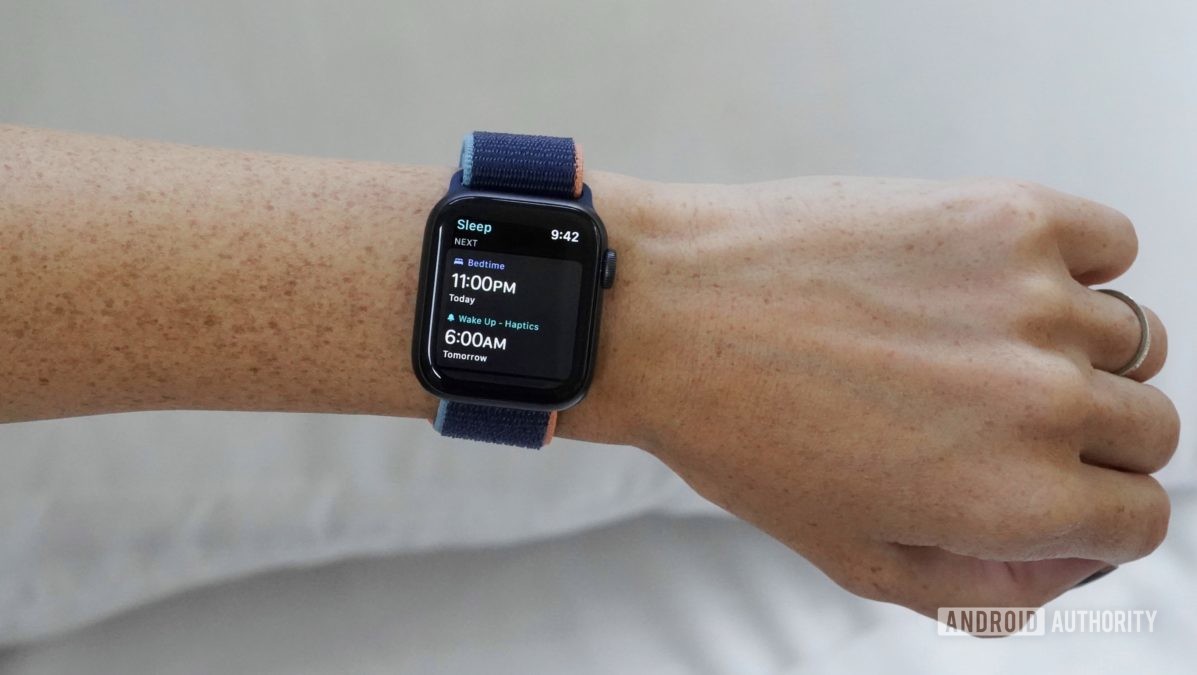![]()
We all know quality sleep is key to overall health, but does the Apple Watch track sleep? The short answer is yes, a bit. With the latest watchOS 7 updates, Apple Watches Series 3 or later now track sleep in the Sleep app, a set-and-forget feature that is simple to start and runs automatically each night. As we mentioned in our Series 6 review, though, Apple’s data is mediocre at best.
How to track sleep on the Apple Watch

Use your Apple Watch to create a routine and cultivate better sleep habits. The CDC recommends adults get at least seven hours of shut-eye a night, and the Apple Sleep app can help you get on track. Create your personalized sleep schedule by following the prompts on your device. Once it’s set up, you can adjust your sleep goal and schedule on your iPhone or Apple Watch. Here’s how to set up sleep tracking on your Apple Watch.
On your iPhone
- Open the Health app and tap Sleep.
- Tap Full Schedule & Options, then under Additional Options, tap Sleep Goal and choose your desired amount.
On your Apple Watch
- Open the Sleep app on your Apple Watch.
- Follow the on-screen instructions to establish a Sleep Goal, Bedtime, and Wake Up time.
Once you’re all set up, the only step left is to wear your Apple Watch to bed. Sleep mode will automatically disable Lift to Wake, so you don’t activate a bright screen while getting comfortable. To temporarily exit Sleep mode, tap your screen and turn the Digital Crown to unlock. Make sure to adjust your charging habits so your device has enough battery to last the night.
What does the Apple Watch track?
If you’re just in it for the basics — think general sleep trends — you may be satisfied. The Sleep app will track your total time asleep and track each time you woke up throughout the night, as well as your heart rate and calorie burn. It will also record how much time you spend in bed and provide weekly and monthly sleep time averages. This data is based on your motion during Sleep mode.
Notably, the app offers the option to create multiple sleep schedules, including a chosen bedtime, preferred wake-up time, alarm, and sleep goal. Based on the schedule you set, your device will automatically enter Sleep mode (which limits distractions before bed and keeps you safe from interruptions while you sleep).
View your sleep history
In the morning, wake up to an informative greeting, then review your night’s rest and compare it to the rest of the week. To view your sleep history, open the Sleep app on your Apple Watch and scroll down to review your data. For more stats, like weekly and monthly averages, or to find out how your heart rate fluctuated throughout the night, access the app on your paired iPhone.
Where does Apple Watch sleep tracking fall short?
So yes, now you can find out how much you are (or aren’t) sleeping, but Apple still misses the mark when it comes to truly insightful data.
Sleep stages
While devices like the Garmin Venu 2 use movement, heart rate, and heart rate variability — the time between each heartbeat — to distinguish REM sleep from non-REM sleep, the Apple Sleep app does not offer any breakdown of how much time you spend in each sleep stage (light, deep or REM). Many other wearables on the market also include sleep stage tracking, so we hope Apple adds this feature to future releases.
Sleep scores
Are you tossing and turning all night long or clocking real, restorative rest? Many wearables, including newer devices from Fitbit, provide a daily sleep score, summarizing your sleep in a helpful and actionable way. Who doesn’t find motivation in a grading system? Without tracking sleep stages, the Sleep app can’t offer this level of insight or data interpretation.
Sleep concerns
The Apple Watch can’t diagnose sleep conditions, so you’ll still need to visit the doctor if you notice anything off. The Withings ScanWatch is one of only a few wearables that can detect signs of sleep apnea or any serious AFib with a medical-grade ECG and pulse oximeter. Your Apple Watch might be able to clue you into some irregularities, but it’s not approved as a medical device.
Simply put, the Apple Watch tracks quantity, but not necessarily quality.
While the Apple Watch does track sleep, the native app still has a ways to go before being very useful. Couple that with the fact that many wearables outperform the Apple Watch in terms of battery life, and Apple still seems behind in the race to track sleep data.
See also: The best sleep trackers you can buy
Get more out of your Apple Watch sleep tracking
Don’t settle for limited info. Many Apple Watch owners use third-party apps to supplement the Sleep app and collect more details.
- The widely popular app Autosleep integrates seamlessly with Apple Health and even offers a similar experience to Apple’s activity rings. Autosleep tracks the duration of your sleep and the quality and lets you know your readiness or how prepared you are for the day based on your rest.
- Another highly-rated option, Sleep++ provides data-driven sleep tracking that lets you know how many times a night you entered deep sleep.
- Pillow offers in-depth sleep analysis charts and a smart alarm clock function that will wake you up at the optimal time for maximum refreshment.